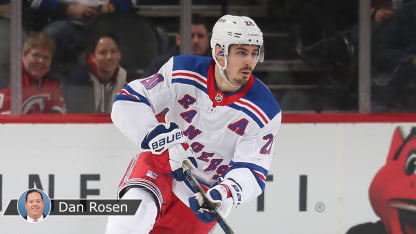The Rangers had faded out of the Stanley Cup Playoff race and became a losing team entering a rebuilding project, but Kreider was the happiest guy in the room.
"There was everything the team was going through and I'm walking around with a grin on my face like, 'Man, this is awesome, I'm playing in the NHL, I'm living my dream,' " Kreider said. "Yeah, I want to win, but I got a gift. I got to step out of the maze and see how awesome this is."
Kreider's outlook on his career is the same now as it was then. The difference is he's entering this season as one of the Rangers' oldest forwards (Mats Zuccarello, 31, is the only projected top-nine forward older than Kreider) and they're counting on him to be a leader after years of being led.
"I definitely think I've got my best hockey ahead of me," Kreider said.
His performance after returning to the lineup last season could be an indication Kreider is on to something.
With his speed and wind back, Kreider again looked like the power forward with the physical gifts that has struck fear into opponents, especially goalies.
He had 15 points (five goals, 10 assists) in 21 games from Feb. 23 to the end of the season, a 58-point pace for an 82-game season. He had 22 points (11 goals, 11 assists) in 37 games before surgery, a 48-point pace.
He was aggressive on the forecheck, the old pin your ears back and go approach. He was hard on the puck, physical all over, a demon darting out of corners and to the front of the net.
"How you generate chances in the NHL is you've got to force turnovers, and if you're not able to in shape or you can't breathe it's pretty hard to do," Kreider said. "Being able to get on top of an opponent was very helpful so we had pucks more and we were generating chances."
Rangers coach David Quinn, in his first season, said the coaching staff is working with Kreider to add penalty killing to his repertoire.
"I feel with his speed, I know if I was on the power play and I saw him coming at me Mach 10 it would make me a little bit uncomfortable, not just up ice but even in zone, loose pucks and stuff like that," Quinn said.
"I think he's trying to make the next step to be a well-rounded player. That's something that he's talked about with us. We certainly feel with his physical skills he's got the ability to do that."
It should have no bearing on Quinn's decision that Kreider has played a total of 7:43 of shorthanded ice time in his 458 career NHL games, including playoffs. Quinn could see the PK as an opportunity to get Kreider on the ice more.
Kreider craves it. After what he went through last season, he also appreciates it more than ever.
"I want to be hard to play against," Kreider said. "I want people to look at the schedule and say, 'Man, I hope we don't match up against his line because I don't want to play against him.' "

